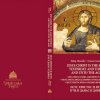The Orchestra, under the direction of its Chief Conductor Muhai Tang, will appear first at Symphony Hall in Chicago on October 6th, then at Severance Hall in Cleveland on October 7th, at Strathmore Music Center in Bethesda, MD on October 8th, and at Carnegie Hall’s Stern Auditorium in New York City on October 9th. Serbian baritone Zeljko Lucic, a Met Opera sensation, will perform as a soloist.
.Programme to be performed in Chicago and New York:
- P. I. Tchaikovsky: Slavonic March
- G. Verdi: Excerpts from the operas Macbeth and Rigoletto; soloist: Željko Lučić, baritone
- J. Sibelius: Symphony No. 2
Programme to be performed in Cleveland and Washington:
- A. Khachaturian: Masquerade, suite
- S. Hristić: The Legend of Ohrid, suite No. 1
- J. Sibelius: Symphony No. 2
Tickets for the tour, on sale now, have been set at family-friendly prices and can be obtained on venue websites.
- October 6, 2014, Orchestra Hall, Chicago, IL
- October 7, 2014, Severance Hall, Cleveland, OH
- October 8, 2014, Strathmore Music Center, North Bethesda, MD
- October 9, 2014, Carnegie Hall , New York, NY





